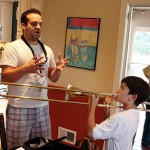A real decision is measured by the fact that you’ve taken a new action. If there’s no action, you haven’t truly decided. – Tony Robbins

Until you take action, it’s not a decision. Are you committed to acting on your decision or are you just flapping your gums? It looks to be a flower, not a ring, but that’s a way to practice.
What does that mean?
This is a quote I first heard years ago, and it really hit home. Why don’t we take action after we make a decision? Because we really haven’t decided.
True, we used the word. We weighed the options and the outcomes against the risks. We picked the one we thought was the best. But then nothing happened afterwards. Because deep down inside, we had not decided.
Whether we were uncertain, afraid, waiting for a better time, or some other excuse, we were not ready to commit ourselves and take action. Until we are ready to take action, we are still hedging our bets, we are still holding back, we are not yet committed.
But once we have taken action, we are committed, and are moving forward along the path we decided to take. That doesn’t mean we shouldn’t pay attention to the results we are getting, though. But we must remain committed to the destination, no matter how the path may change.
Why is action important?
Action is the cure to procrastination. You can have one or the other, and by taking action, you banish procrastination. Often procrastination is accompanied by fear. Sometimes the fear is real, and due consideration must be taken to deal with legitimate risks. However, usually fear is an excuse.
Action is what we want, not words. You can say you decided, but those are just words, right? Until those words are backed by your actions, you really haven’t done much, have you? Action is the proof that you are committed, that you are going to make things happen.
Without action, we are free to change our minds at any time. That is fine in the investigation or planning phases, but once it comes time to decide, you will cut off the other possibilities and then take action on the plan on which you decided to embark.
Without action, nothing will happen, except by random chance, and that’s not very likely to move you in the direction you want. To get where you wish to go, you have to decide where that is and how you will get there, and then you have to go, or take action. Are you convinced yet? 8)
Where can I apply this in my life?
An old expression that will be familiar to those who fish is “Fish or cut bait” which says if you’re cutting bait, you aren’t fishing. You may need to cut bait first, but once you have decided what you’re trying to catch and prepared the bait, it’s time to put the knife away and get out the fishing pole.
When I met my wife, I was just finishing up a nasty divorce. My wife knew not to push me to get married again, as that would be counterproductive. After about a year and a half of dating, I was sufficiently healed, and gave myself a deadline by which to decide if I was going to fish or just continue to cut bait.
It took about a week to go through all the pros and cons of proposing (and all that would follow after it), I decided to do so. I planned the date and the circumstances and got the ring. On the arranged date, I proposed, and she accepted. Fortunately, the only fear was of committment, and not rejection. 8)
That story approached the topic of fear, as I was able to, with somewhat subtle hints, assure myself of her answer before I asked. In a similar manner, we can often allay our fears by gathering additional information or finding additional support. I went skydiving because a Military Dive Master selected the site and helped allay my fears.
Back to the question of your life, where are you stuck? Where are you ‘decided’ but not yet acting? Grab some paper and start making a list. What are your concerns? What specifically is holding you back? Write these things down as well. Now pick one of the items on your list.
What would it take for you to cross those off with confidence? Who could help you get the information, the skills, or go with to help guide you? What skills or knowledge could you gain to do it for yourself? Write these things down, and brainstorm ideas for how to make them happen.
With all the things holding you back from taking action written down, along with at least one potential solution for each, the next thing to do is to figure out which one to tackle first. That’s right, in order to get to your decision, you’re going to have to start by taking a small action.
Things generally don’t get done without your help. Decide and then do. Adjust your methods to get the desired result. Repeat and repeat and repeat until you get to where you want to be. Action, like decisions, are a habit. If you do it often enough, you will find it easier and easier to do.
Make acting on your decisions a habit, and practice regularly.
From: Twitter, @tonyrobbins
confirmed at : http://en.wikiquote.org/wiki/Anthony_Robbins 1st quote from Awaken the Giant Within
Photo by Ibrahim Asad’s PHotography







Firstly, great blog. Thanks for sharing.
On this quote, it just feels a bit like it’s not thought through. Your interpretation is good and puts forward some great ideas to think on. The quote, however, doesn’t take into account scenarios where the best decision made is not to act.
There have been plenty of times where, in my personal and professional experience, it has been better to watch and see how things pan out before acting. I suppose the premise of “real” decision and not “truly” deciding attempts to cover this, but it’s not an elegant way of closing the logic.
Procrastination in itself is not good, but waiting as an active choice is just as reasonable a response as action. I’d hate for someone to read this quote and not see that third way being available and indeed right, for some situations.
I agree whole-heartedly. However, that scenario is another 800+ word blog post. Time and space did not permit. The purpose of my blog is NOT to be the final authority on the topic, but to get the reader thinking about the topic and how it applies to them. I do believe I succeeded with this one, right? 8)
I am very glad you pointed this out, so that others may read and understand. Thanks for taking the time to comment.
There is also the case where the action you take is to cease acting. The decision to stop doing something that no longer serves you would be such a case.